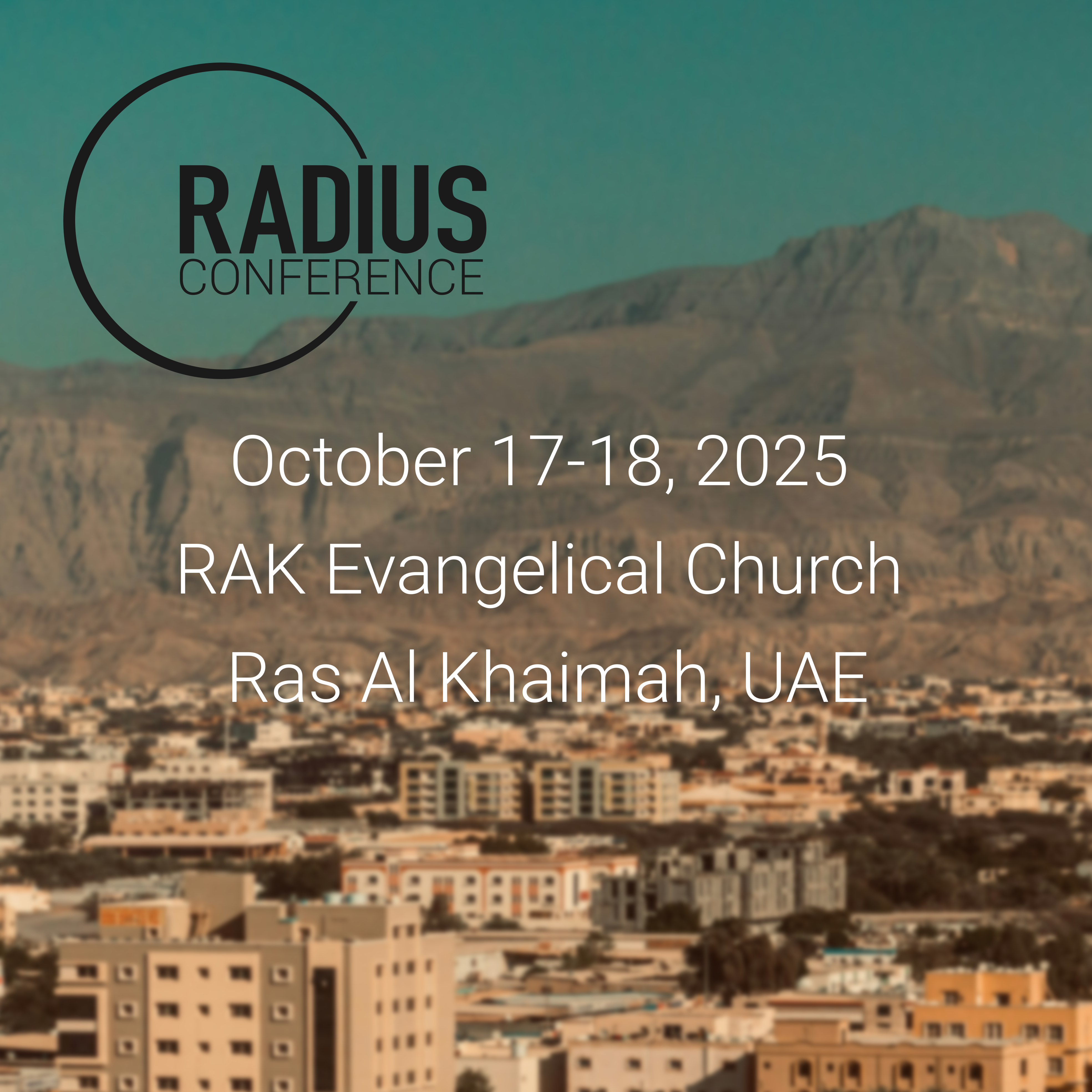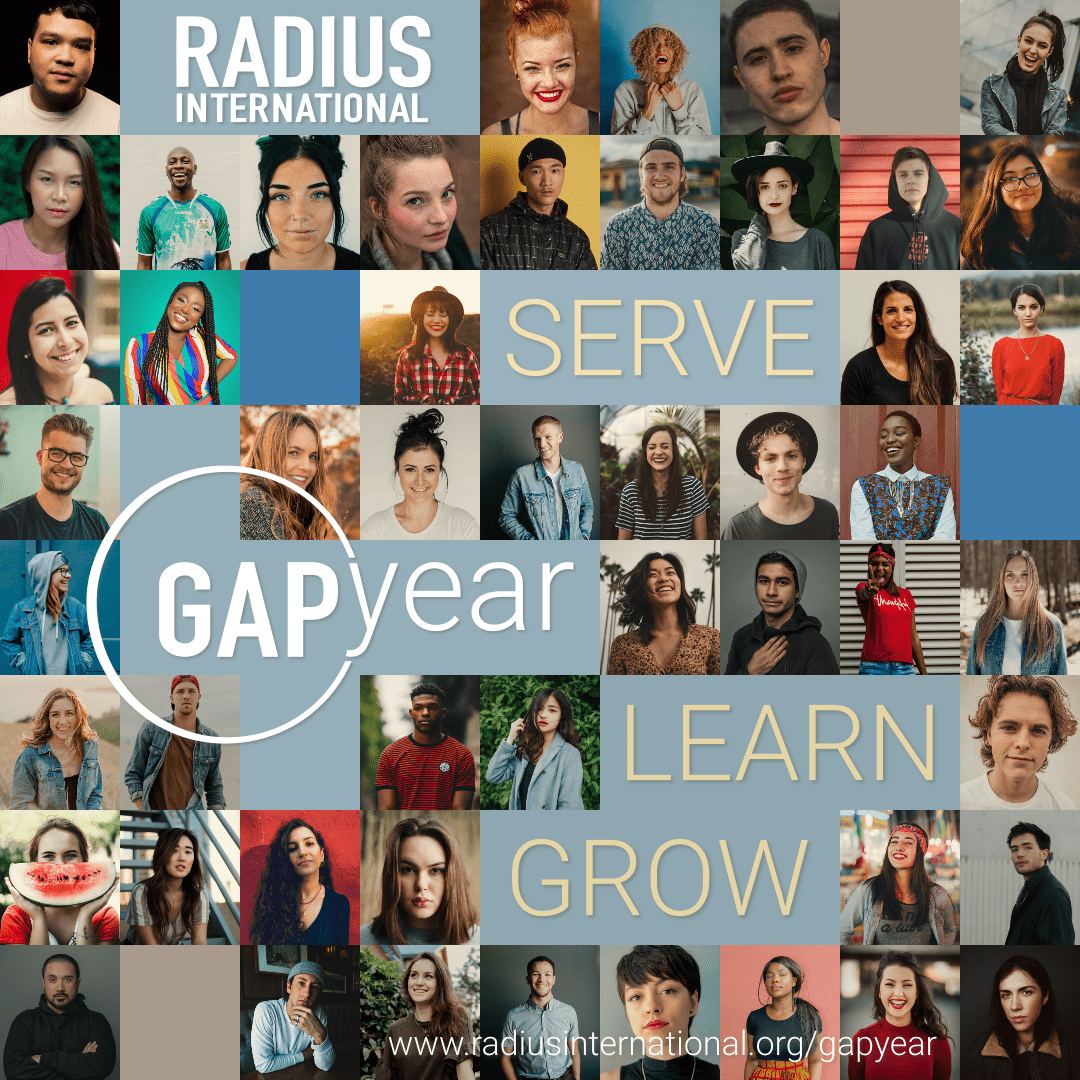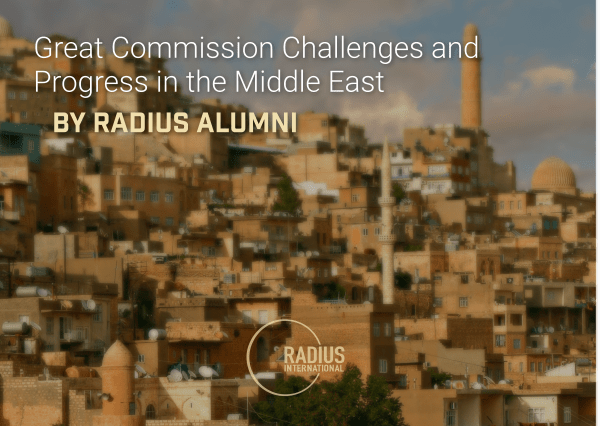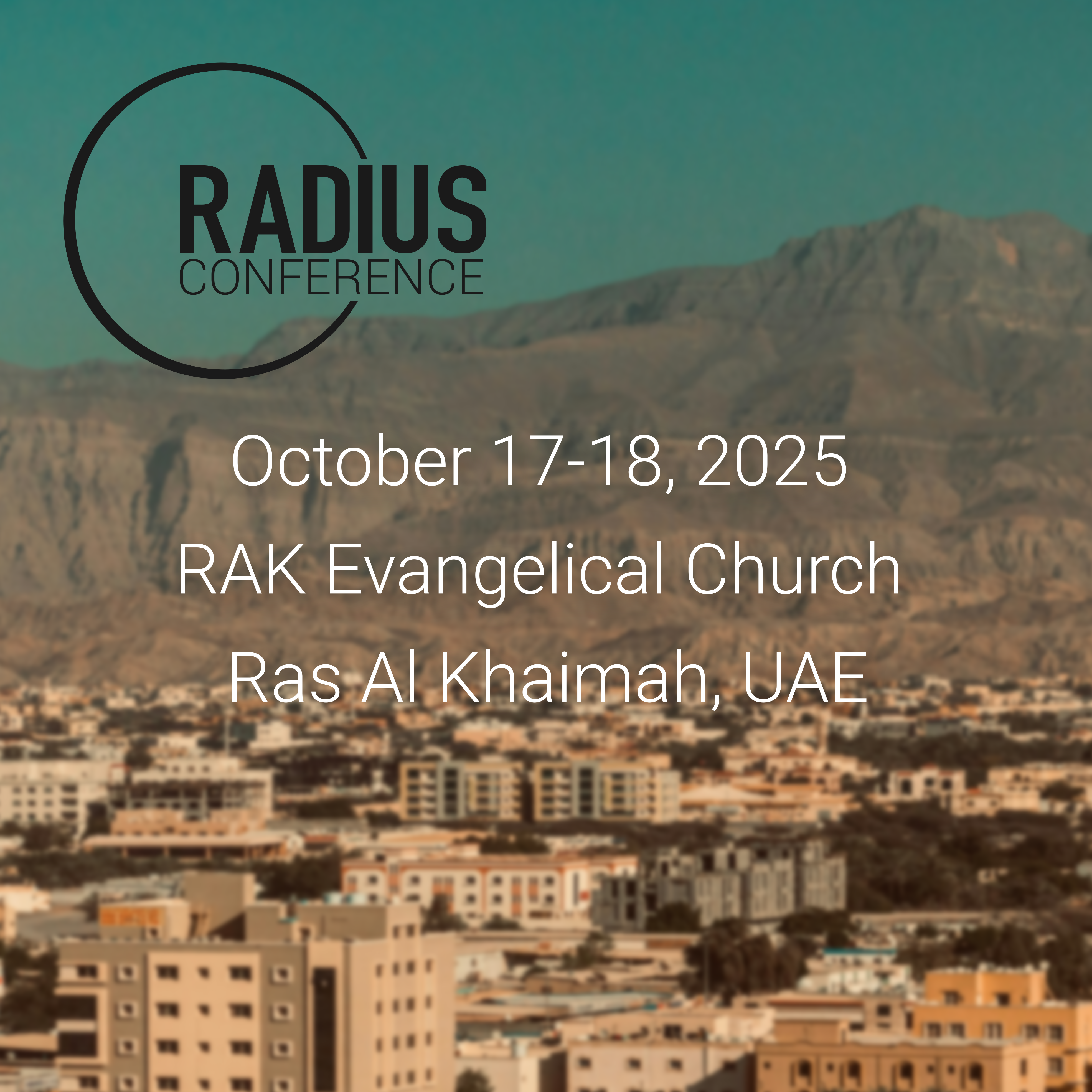What words come to your mind when you think of the Middle East? If I had to guess, I think most westerners would probably throw out topics like conflict or Islam or hostility to the West. Sadly, those three topics most certainly do accurately describe certain aspects of the region that my family calls home, however, we would also probably throw in a few more kind descriptors of the region such as hospitable, kind, and full of good food.
The Middle East is the birthplace of the Christian faith, but it is also the home of perhaps the greatest regression of “Gospel-spread” in Christian history. What is God doing in the Middle East today? I hope to share a few personal reflections on this question in this article as well as introduce you to some of the most relevant topics for missionaries and their sending churches as they consider serving in the Middle East.
But first I’ll start with an introduction: My wife and I are 2018 Radius grads who’ve served in three different Middle Eastern countries thus far since graduation (we left one country by choice after finishing Arabic studies and we left our second country due to conflict). Before going to Radius, we spent about five years serving Muslim immigrants in the U.S. (this humbling experience thoroughly convinced us of the need to go to a training like Radius before moving overseas). Our time serving in the Middle East has been one of the greatest experiences of our lives (despite the many difficulties we’ve faced) and we consider it an incredible privilege that the Lord would allow us to have gotten to know so many beautiful individuals in this region and to be involved in a small way in what He is doing here. Although we have gained a variety of experiences and perspectives from Radius and from the varied contexts we’ve served in, I will be the first to admit that my knowledge of the Middle East is still growing and, therefore, what I’m about to share should not in any way be considered comprehensive.
Note: When I say “Middle East” I am primarily referring to countries where Arabic is the trade language (this would include all of North Africa, the Levant, and the Arab Gulf) although some of what I share is applicable to all Muslim countries.
Great Commission Progress in the Middle East
The Middle East comprises about twenty countries and three hundred million souls. Although this region is relatively small in proportion to the rest of the world, its impact is disproportionately large; when the Middle East “quakes” (which seems to happen more often than the rest of the world), the whole world follows suit. Moreover, although the majority of Muslims live outside of this region (in places like India and Indonesia), the Middle East still functions as the heart of global Islam; this is because this region is the birthplace of Islam, the home of all of the most holy cities and shrines in Islam, and and also because Middle Eastern society still functions in Arabic which is the “holy language” of Islam. It stands to reason, therefore, that seeing Great Commission progress in the Middle East may have a disproportionately large positive effect on reaching all of the world’s 1.5 billion Muslims.
Although there is still much work to be done in the Middle East, we can praise God for church growth and the spread of the Gospel in this region. The Middle East was spurned by early Christian missionaries who chose to go to less hostile countries first. When larger numbers of missionaries did begin arriving in the Middle East over the past hundred years (led in large measure by the pioneer Samuel Zwemer), they found Muslims hostile to the message, however, in certain Arab countries there were nominal Arab Christians who were much more open to the Gospel (the already-present millenia old Arab Christian denominations had nearly completely lost the Gospel message by this time). Many missionaries shifted focus to reaching these Arab “Christians” and planted new evangelical denominations among them in the long-term hope that local believers would be more effective missionaries in reaching Arab Muslims than westerners.
Although it has taken longer than at first hoped, the children’s children of this first generation of converts have become more bold and willing than previous generations to reach Muslims, and indigenous Christian missionaries have even started to be raised up in two or three contexts over the past thirty years or so. Currently, there is a great need for biblical and missiological training for these indigenous Christian missionaries; far too often, they are only exposed to “magic-bullet”, quick-fix methodologies like DMM, CPM and similar methodologies. Moreover, most indigenous missionaries I’ve met also have no concept of incarnational ministry and western mission leaders (or donors) wrongly minimize the culture and worldview gap that exists between indigenous Christians and nearby (or geographically distant) Muslims; indigenous missionaries still need to be taught skills to learn the culture and worldview (and oftentimes the different Arabic dialect or language as well) of the people they are trying to reach, but unfortunately there is little training currently being done in these areas (pray for workers to be raised up to possibly start a “Radius: Middle East”).
In other parts of the Middle East where even the “nominal” Arab church has not been present for centuries, there have also been trickles of individuals who’ve come to Christ through missionaries or media campaigns. In some contexts, these individuals are unable to find any local churches and must follow Christ completely alone; in other contexts, these believers are able to join already established Arab churches; and, in rare situations, groups of Muslim-Background Believers have even begun to meet together as a church. Although these new believers still only represent a “trickle” of all that God’s Word promises for these nations (Matthew 24:14), we have much to give thanks for in view of the absolute lack of almost any “drops” entering the Kingdom in previous decades.
Despite the excitement of seeing the church grow in the Middle East and in seeing new fields experience “first fruits”, we cannot minimize the incredible need this region still has for more workers: there are still entire language groups and cities completely lacking any indigenous church. Moreover, there is a great need for discipleship and training of the new generation of indigenous believers. Let us pray to the Lord of the Harvest for more workers for this field!
Reflections on Arabic
On our first visit to the Middle East we stayed with a couple who’d lived there about ten years and had become fluent Arabic-speakers; this couple shared with us that they’d seen many workers arrive that are intent on gaining fluency in this important (and religious) language only to fall far short of their goal and return home (at least in many instances). This couple instilled in us a healthy humility and seriousness to our Arabic study that kept us from taking for granted that we’d for sure reach fluency just by putting in the time. By the grace of God, we (and our three other teammates) did reach our goal of Advanced High on the OPI Evaluation within two and a half years of landing overseas.
With an incredibly complex grammar, ten phonemes not present in English, and the presence of diglossia, Arabic is quite a beast to tackle for native English-speakers (The State Department classifies Arabic as a Level Four: Super-hard Language”; if you’re surprised The State Department couldn’t find a more professional name for this level, that makes two of us) I believe Arabic’s difficulty has led to a few different effects on missionaries in this region:
- Missionaries in Arabic-speaking countries very rarely plan to learn another language after Arabic (how could someone think beyond Arabic?), which has led to a general neglect of unreached language groups in our region.
- Missionaries have been especially attracted to mission methodologies that do not include language fluency as one of their key components; although this search for the missions “magic bullet” is common throughout the entire missions world, I believe it is more prominent in the Middle East where even less workers reach their desired level of fluency and then end up wrestling with the question, “Can I still be used here to reach people?” The “Person-of-Peace” concept that is present in several common missions methodologies is an example of this: according to this concept, if the missionary just finds the Person-of-Peace, then that person will be able to impact his entire community (despite not speaking the language fluently).
Once, after sharing with another missionary in our city that our team had an expectation that team members reach Advanced High on the OPI Evaluation, he expressed awe that our team had a “ten-year goal.” Nevertheless, despite the experience and opinions of many, gaining fluency in Arabic is both possible and reasonable for most well-trained missionaries who arrive in the Middle East with the appropriate expectations (I tell new missionaries to plan to study Arabic full-time for three years and, if it ends up being less than that, just give thanks to the Lord for every month it takes less than that).
Near the end of my formal Arabic learning, I spent a number of my three-hour classes explaining the Trinity and the Atonement with different Language Helpers who had asked me to explain these concepts to them. These were extremely encouraging conversations for me (I think I’ve now got more experience discussing the Trinity in Arabic than I do in English), but it’s reasonable to ask, “Where did the curiosity of these Muslim Language Helpers come from?” Several of these Language Helpers told me that they had had Christian students open these complex subjects with them months or years beforehand, however, when they asked these Christian students to explain these concepts to them, they proved unable to do so (it seems they were still in early phases of their Arabic learning); moreover, unfortunately, it does not seem that any of these students were ever able to follow up on these Language Helpers’ initial interest (it’s likely they did not stick with their studies until fluency). I share this story in order to demonstrate the opportunities available to those who do reach fluency in Arabic, but also the sad reality that few get there. Join us in praying for more well-trained missionaries to arrive in the Middle East who will become fluent in Arabic!
Conclusion
God is working to redeem a people for Himself among all the nations of the Middle East. Much progress has been made in recent years, but much work remains. Apart from learning an extremely difficult trade language, Missionaries coming to the Middle East often face hostility and instability (sometimes turning into all out conflict), but they can rejoice knowing that their Savior will be with them always and that He:
“….will not grow faint or be discouraged
till he has established justice in the earth;
and the coastlands wait for his law.”
Isaiah 42:4 (ESV)

Nathan Smith—(Pseudonym)
Alumni of Radius International
This blog post was written by one of our alumni on the field.
 We train individuals, couples, and families who are committed to long-term, pioneer church planting among unreached language groups. RADIUS students acquire spiritual, relational, emotional, and moral maturity as well as the physical stamina that will enable them to survive the rigors of cross-cultural work and life.
We train individuals, couples, and families who are committed to long-term, pioneer church planting among unreached language groups. RADIUS students acquire spiritual, relational, emotional, and moral maturity as well as the physical stamina that will enable them to survive the rigors of cross-cultural work and life.
 Do you desire to take the Gospel to those who have never heard and see a healthy church established? Apply today for our immersive training program.
Do you desire to take the Gospel to those who have never heard and see a healthy church established? Apply today for our immersive training program. Are you interested in learning first-hand about RADIUS training and whether or not it is a good fit for you or your people? Join us for RADIUS Days to see campus, sit in on classes, and interact with current students, interns, and staff.
Are you interested in learning first-hand about RADIUS training and whether or not it is a good fit for you or your people? Join us for RADIUS Days to see campus, sit in on classes, and interact with current students, interns, and staff. Come to one of our campuses in Mexico for a week-long, intensive program to serve via various campus work projects, learn more about The Great Commission, and get a taste of what our students experience during their year with us.
Come to one of our campuses in Mexico for a week-long, intensive program to serve via various campus work projects, learn more about The Great Commission, and get a taste of what our students experience during their year with us. Join us for The Radius Conference on October 17-18th, 2025 at RAK Evangelical Church in Ras AL Khaimah, UAE.
Join us for The Radius Conference on October 17-18th, 2025 at RAK Evangelical Church in Ras AL Khaimah, UAE. Spend 9 months in Mexico and play a vital role in The Great Commission through serving our staff and students while gaining valuable cross-cultural experience and opportunities to grow in your faith.
Spend 9 months in Mexico and play a vital role in The Great Commission through serving our staff and students while gaining valuable cross-cultural experience and opportunities to grow in your faith. Would you like to join us in our efforts to further the spread of the Gospel in still-unreached places? Support the work of RADIUS International by donating online.
Would you like to join us in our efforts to further the spread of the Gospel in still-unreached places? Support the work of RADIUS International by donating online. Are you or your church interested in giving towards a special missions opportunity? Learn more about some of our current projects.
Are you or your church interested in giving towards a special missions opportunity? Learn more about some of our current projects. Partner with some of our current students by paying their tuition/room & board.
Partner with some of our current students by paying their tuition/room & board. Reimburse RADIUS for on-campus lodging and/or meals.
Reimburse RADIUS for on-campus lodging and/or meals. Check out our blog for recent posts from our staff, alumni, and ministry partners.
Check out our blog for recent posts from our staff, alumni, and ministry partners. Purchase recommended books from our online bookstore at 10ofthose.com.
Purchase recommended books from our online bookstore at 10ofthose.com.
 Do you desire to take the Gospel to those who have never heard and see a healthy church established? Do you think RADIUS might be a good fit for you? Apply today!
Do you desire to take the Gospel to those who have never heard and see a healthy church established? Do you think RADIUS might be a good fit for you? Apply today!
 Interested in working with RADIUS? Learn more about open positions.
Interested in working with RADIUS? Learn more about open positions.



